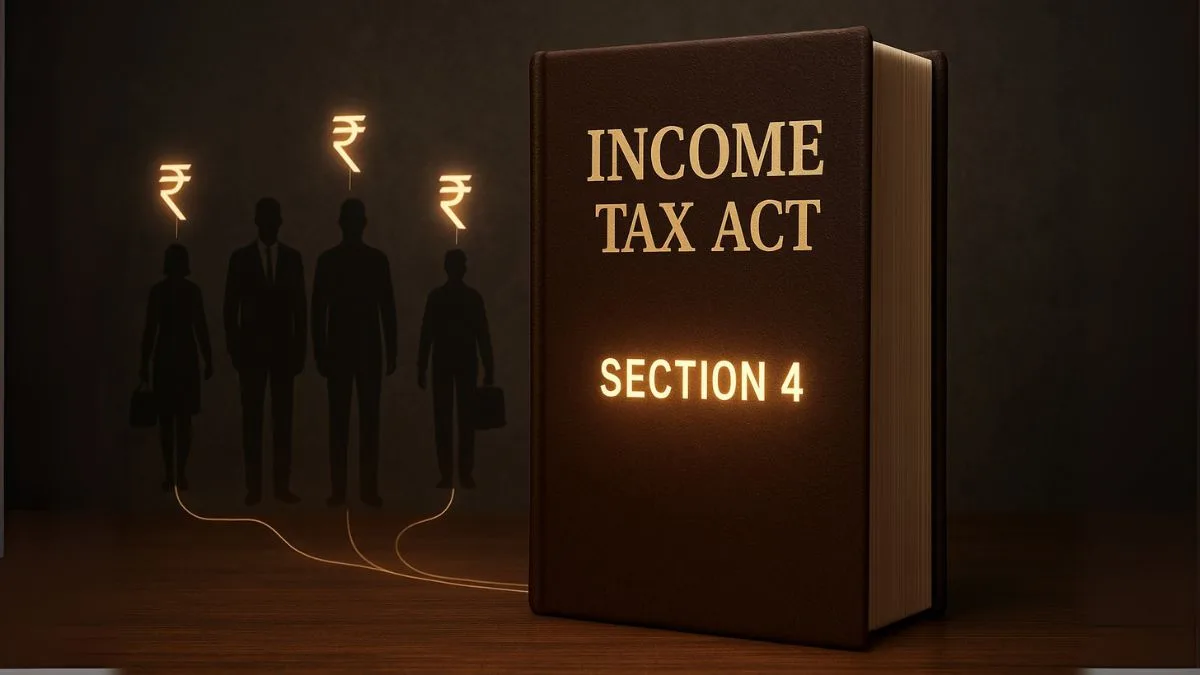
Section 4 of the Income Tax Act forms the very backbone of India’s income tax system. It provides for the charge of income tax on the total income of a taxpayer for any financial year. If you have ever wondered how the income tax system in India begins its assessment of taxable income, then Section 4 is the starting point.
In this detailed yet simple blog, we will break down Section 4 of the Income Tax Act, its explanation, key provisions, & relevance for individual taxpayers, HUFs, & firms—especially those filing returns through ITR-4.
What is Section 4 of the Income Tax Act?
At its core, Section 4 of the Income Tax Act of 1961 outlines the fundamental principle that income tax shall be charged on the total income of every person for the previous year. This section applies unless otherwise provided by the Act.
In other words, Section 4 is the legal provision that gives the government the authority to collect income tax. It does not specify rates or exemptions but sets the foundation: that income tax is applicable, & the law provides the framework for calculating the tax payable.
Basis of Charge under Section 4 of the Income Tax Act
The basis of the charge of income tax under Sections 4 to 9 is crucial to understand. Here's how it works:
- Section 4 of the Income Tax Act declares that income tax is levied on every person.
- The total income is computed under various heads such as:
- Salaries
- House property
- Business or profession
- Capital gains
- Other sources
- The charge is annual. This means the income of one financial year (April to March) is taxed in the next assessment year.
This section is also linked to the basis of the charge of income tax notes found in Sections 4 to 5.
Section 4 of Income Tax Act Explanation with Examples
Let’s take a quick example:
Suppose you are a salaried individual earning ₹8,00,000 annually. Your total income includes your salary, bank interest, and rental income. Section 4 of the Income Tax Act is the first legal step that brings you under the income tax net. The subsequent sections then guide how your income will be computed, what exemptions you can claim, & how much tax you pay.
Section 4 of the Income Tax Act explanation clarifies that this law applies universally, regardless of the amount of income. However, the practical application depends on specific thresholds, exemptions, & rates provided elsewhere in the Act.
Who Needs to File Tax Under Section 4? (ITR-4 Applicability)
The Income Tax Act requires certain individuals & entities to file tax returns based on their income levels. Under Section 4:
- Resident Individuals
- Hindu Undivided Families (HUFs)
- Firms (other than LLPs)
can opt for ITR-4 under the Presumptive Taxation Scheme (if eligible). This scheme simplifies tax calculation for small businesses & professionals.
Thus, ITR-4 can be filed by a Resident Individual / HUF / Firm whose income is within the prescribed limits."
Section 4 of Income Tax Act 1961: Key Takeaways
To sum up Section 4 of the Income Tax Act, 1961:
✅ It provides for the charge of income tax.
✅ It is the legal basis of charge for Indian income tax.
✅ It is the starting point for every taxpayer's obligation to pay tax.
✅ It applies to individuals, HUFs, firms, companies, & others.
✅ ITR-4 is the simplified return linked with small taxpayers, covered by Section 4 as the foundation.
Section 4 & Related Provisions
You will come across references like:
- Sections 4 & 5 of the Income Tax Act
- Subsection 4 of Section 90 of the Income Tax Act
- Section 4 explanation notes
- Section 4 of the Income Tax Act Malaysia (for comparative study)
While these might seem overwhelming, at the heart of it all is this simple idea: Section 4 says tax must be charged, & the rest of the Act explains how & how much."
Section 4 of Income Tax Act 1961 and Practical Relevance
Today, as taxation becomes increasingly digitised with faceless assessments & online filings, the relevance of Section 4 of the Income Tax Act explanation remains as strong as ever.
For professionals, salaried individuals, startups, & small businesses, understanding this section helps in:
- Knowing your basic tax obligations.
- Filing the correct ITR form (for many, it is ITR-4).
- Avoiding notices for non-filing or under-reporting of income.
Even though Section 4 may seem legalistic, it affects everyone earning any form of income."
Final Note (Natural Call to Action)
Filing taxes can feel overwhelming, but understanding basics like Section 4 of the Income Tax Act makes it easier. If you need professional help with income tax filing, planning, or compliance, our experts at Callmyca.com are just a click away—because your peace of mind matters as much as your tax savings!











